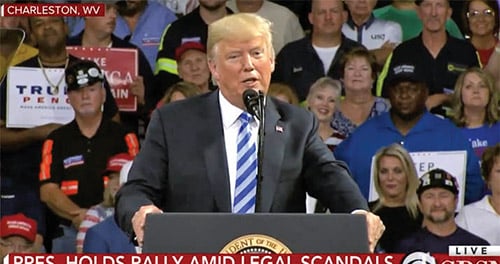


At a rally in West Virginia, Trump said it was now the Palestinians’‘turn’ to ‘get something very good’ in potential peace talks with Israel.
President Donald Trump said this week that Israel will have to pay “a higher price” in peace talks with the Palestinians as a result of official U.S. recognition of Jerusalem as Israel’s capital last year. Speaking at a rally Tuesday evening at the Charleston Convention Center in West Virginia, just hours after the eight-count conviction of his former campaign chairman Paul Manafort and the guilty plea of his personal lawyer Michael Cohen, Trump made no mention of domestic legal proceedings. Instead, he stated it was now the Palestinians’ “turn” to “get something very good” in potential peace talks with Israel.
Trump touted his decision to recognize Israel’s claim over Jerusalem and move the U.S. embassy there, which sparked international condemnation and drew the ire of the Palestinians. “If there’s ever going to be peace with the Palestinians, then this was a good thing to have done,” Trump said of his decision. “We took it off the table. In past negotiations, they never got past Jerusalem. Now Israel will have to pay a higher price because it’s off the table. The Palestinians will get something very good because it’s their turn next.”
This was not the first time Trump has said that Israel will need to pay a price for U.S. recognition of Jerusalem as Israel’s capital. Speaking alongside Israeli Prime Minister Benjamin Netanyahu at the World Economic Forum in Davos back in January, Trump said, “There were never any [peace] deals that came close because [of] Jerusalem. You couldn’t ever get past Jerusalem. So when people said, oh, I ‘set it back,’ I didn’t set it back. I helped it. Because by taking it off the table, that was the toughest issue. And Israel will pay for that.”
President Trump plans to introduce his Middle East peace plan, dubbed the “deal of the century,” during the U.N. General Assembly meeting in New York next month, the Palestinian daily Al-Quds reported.
The United States has, in the past, warned that if Palestinian Authority leader Mahmoud Abbas remains adamant in his refusal to engage the United States as a mediator in the Israeli-Palestinian peace process, Washington will introduce its regional peace plan regardless of his reservations.
Abbas has been shunning the U.S.’s peace efforts since Trump’s Dec. 6 recognition of Jerusalem as Israel’s capital and the subsequent move of the U.S. Embassy in Israel from Tel Aviv to Jerusalem, and has accused the Trump administration of being “grossly biased” in Israel’s favor.
According to the report, U.S. Special Representative for International Negotiations Jason Greenblatt, senior White House adviser Jared Kushner, U.S. Ambassador to the United Nations Nikki Haley and U.S. Ambassador to Israel David Friedman, who have been working on the plan since early 2017, seek to introduce it under the “most optimal conditions” and the General Assembly is seen as the best venue to do so.
Last week, the four envoys released a joint statement on Twitter acknowledging that “no one will be fully pleased” with the much-anticipated Israeli-Palestinian peace plan.
“No one will be fully pleased with our proposal, but that’s the way it must be if real peace is to be achieved. Peace can only succeed if it is based on realities,” the statement said.
The 73rd General Assembly session will be held from Sept. 18 to Oct. 5 and will feature speeches from prominent world leaders, including Trump, who is set to address the assembly on Sept. 25.
Al-Quds quoted an unnamed American official as saying that Trump has been keeping the details of the plan close to the vest as he prefers to outline it in full at the world leaders’ meeting.
The source said Trump believed that if his plan for Middle East peace were to fail, no other U.S. plan would be able to resolve the decades-long regional conflict.
The official stressed that it would be up to the Israelis and Palestinians to accept or reject the plan.
By JLNJ Staff with JNS and combined sources









